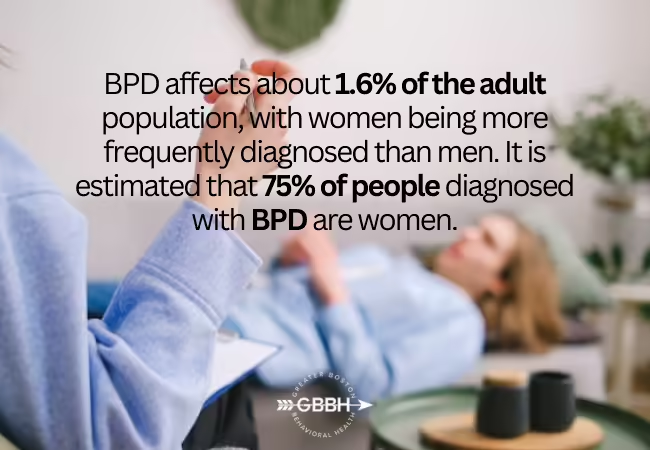Personality disorders are a category of mental health conditions that significantly impact a person’s behavior, thinking patterns, and emotional regulation. Unlike temporary mood fluctuations, these disorders are long-lasting and tend to begin in adolescence or early adulthood. According to the National Institute of Mental Health (NIMH), personality disorders affect approximately 9-15% of the general population, with various types presenting different challenges and characteristics.
Recognizing the Signs and Symptoms of Personality Disorders
Personality disorders manifest through specific patterns of behavior that differ from cultural norms and cause significant distress or functional impairment. Here’s what to look for:
General Symptoms
- Persistent, negative thought patterns that skew reality.
- Difficulty maintaining relationships due to unusual or erratic social behaviors.
- Intense emotional responses that seem disproportionate to the situation.
- Low impulse control, leading to risky or harmful behavior.
- Chronic feelings of emptiness or being misunderstood.
Types of Personality Disorders
- Borderline Personality Disorder (BPD): Characterized by severe mood swings, unstable relationships, and a fear of abandonment. People with BPD may engage in impulsive behaviors and have trouble managing anger.
- Antisocial Personality Disorder (ASPD): Often marked by deceitful, manipulative, and harmful behaviors, often without guilt. Individuals with ASPD may disregard social norms and other people’s rights.
- Avoidant Personality Disorder (AVPD): Involves severe social anxiety, feelings of inadequacy, and a constant fear of being judged or rejected.
- Narcissistic Personality Disorder (NPD): Features a grandiose sense of self-importance, a lack of empathy, and a need for excessive admiration.
- Obsessive-Compulsive Personality Disorder (OCPD): Marked by a preoccupation with order, perfection, and control that can interfere with daily functioning.
The Importance of Early Intervention
Early intervention is crucial for individuals who exhibit signs of a personality disorder. Recognizing symptoms and seeking professional help at an early stage can prevent the condition from worsening and help individuals develop effective coping mechanisms. Early treatment may also decrease the risk of developing other mental health conditions, such as anxiety and depression, which commonly co-occur with personality disorders.
Family members and friends play a vital role in encouraging individuals to seek treatment. Providing a supportive environment and gently urging them to consult a mental health professional can make a significant difference. Early diagnosis often leads to better outcomes as it allows for the implementation of therapeutic strategies and coping mechanisms before the disorder significantly impacts daily functioning and relationships.
Coping Strategies for Managing Personality Disorder Symptoms
Managing the symptoms of a personality disorder can be challenging, but several strategies can help individuals maintain stability and improve their quality of life. Here are some effective approaches:
- Mindfulness and Meditation: Practicing mindfulness helps individuals stay present, manage impulsive thoughts, and reduce emotional reactivity. Meditation can improve self-awareness and promote a sense of calm.
- Journaling: Keeping a journal can help track thoughts and emotions, providing valuable insight into triggers and patterns that may affect behavior and mental state.
- Setting Boundaries: For individuals with personality disorders, setting clear and healthy boundaries is essential. This helps manage relationships and reduce conflicts.
- Structured Routines: Maintaining a daily routine can help create a sense of stability and predictability, which can be particularly beneficial for those who struggle with emotional regulation.
- Therapeutic Techniques: Techniques such as cognitive-behavioral therapy (CBT) and dialectical behavior therapy (DBT) are highly effective in helping individuals develop coping skills and manage symptoms. These therapies focus on changing negative thought patterns, enhancing emotional regulation, and building healthier behaviors.
Challenges in Diagnosis and Treatment
Diagnosing personality disorders can be complex due to their varied symptoms and overlapping traits with other mental health conditions. Often, individuals may experience co-occurring conditions like depression, anxiety, or substance abuse, making diagnosis more challenging. This complexity can sometimes lead to delayed or misdiagnosis, contributing to a longer path toward effective treatment.
Treatment for personality disorders often requires a multi-faceted approach involving a combination of psychotherapy, behavioral interventions, and sometimes medication. However, stigma and misconceptions about mental health can prevent individuals from seeking help. Additionally, not all treatment options are suitable for every individual, so finding the right approach may involve some trial and error.
The Role of Medication in Treating Personality Disorders
While therapy is the cornerstone of treating personality disorders, medication can also play an important role, especially when managing severe symptoms or co-occurring conditions. Medications are often prescribed to alleviate specific symptoms such as anxiety, depression, or mood instability. Commonly used medications include:
- Antidepressants: Often used to manage depression and anxiety symptoms that accompany personality disorders.
- Mood Stabilizers: These can help regulate extreme mood swings and emotional reactivity.
- Antipsychotic Medications: In some cases, these may be used to help manage symptoms such as paranoia or delusional thinking.
Medication should always be prescribed and managed by a qualified mental health professional, and it is often most effective when combined with psychotherapy. It’s essential to monitor for side effects and adjust the treatment plan as needed to achieve the best outcomes.
When to Seek Emergency Help
There are situations where immediate help is necessary, especially when symptoms escalate to the point of self-harm or suicidal thoughts. If you or someone you know is in distress or experiencing thoughts of self-harm or suicide, it is vital to seek emergency assistance immediately. Here’s what you should know:
- Crisis Hotlines: Reach out to a crisis hotline or helpline for immediate support. For example, in the United States, the Suicide & Crisis Lifeline is available at 988, offering 24/7 confidential support.
- Emergency Services: If the situation is severe, call 911 or visit the nearest emergency room for immediate intervention.
- Safety Plan: Developing a safety plan with a mental health professional can be beneficial for individuals with personality disorders to help them manage crises effectively.
The Importance of Seeking Professional Mental Health Treatment
If you recognize these traits in yourself or a loved one, it’s essential to reach out to a qualified mental health professional for an evaluation. Early diagnosis and treatment can help manage symptoms and improve quality of life. Treatment options typically include:
- Individual Therapy: One-on-one sessions with a licensed therapist to explore emotions and learn coping strategies.
- Group Therapy: Sharing experiences with others facing similar challenges to build support and reduce isolation.
- Medication: In some cases, medication may be prescribed to manage symptoms like anxiety and depression, which often co-occur with personality disorders.
- Supportive Therapies: Including mindfulness practices, stress management techniques, and psychoeducation.
The Role of Therapy in Treating Personality Disorders
Effective therapy is at the core of managing personality disorders. Cognitive-Behavioral Therapy (CBT) is one of the most common approaches, helping individuals recognize and change negative thought patterns. Dialectical Behavior Therapy (DBT), developed specifically for those with BPD, focuses on building emotional regulation skills, mindfulness, distress tolerance, and interpersonal effectiveness.
Greater Boston Behavioral Health offers a variety of specialized programs, including:
- Intensive Outpatient Program (IOP): Ideal for those who need structured support but don’t require full-time hospitalization. IOPs provide several hours of therapy each week, offering support from therapists and peers.
- Partial Hospitalization Program (PHP): A more intensive level of care that involves multiple daily treatment sessions and access to a multidisciplinary team of healthcare providers.

How Therapy Programs Can Help with Personality Disorders
Therapy at Greater Boston Behavioral Health is tailored to meet the needs of each individual, providing a supportive environment where you can explore feelings and build healthier patterns of thinking and behavior. Services include:
- DBT for Emotional Regulation: This approach is especially helpful for individuals with borderline traits and focuses on increasing emotional stability and improving interpersonal relationships.
- CBT for Cognitive Restructuring: CBT helps you challenge harmful thinking patterns and replace them with more constructive, reality-based beliefs.
Our Mental Health Treatment Center in Massachusetts is equipped with experienced therapists who are trained to handle the complexities of personality disorders and provide compassionate, effective care.
When to Seek Help: Signs You Need Support
Recognizing that you need help can be difficult, but it is an essential first step. If you find that your behaviors are impacting your relationships, career, or emotional well-being, seeking professional treatment can make a significant difference. Early intervention helps prevent worsening symptoms and aids in the development of better coping mechanisms.
The Benefits of Early and Ongoing Treatment
Treatment for personality disorders is not a one-time event; it’s an ongoing process that can lead to significant improvements in managing emotions and improving social functioning. Some benefits include:
- Enhanced ability to manage stress and difficult emotions.
- Improved communication and relationships.
- A decrease in self-destructive or impulsive behaviors.
- A higher quality of life and greater self-awareness.
Conclusion
If you suspect you or a loved one may have a personality disorder, reaching out for help is an essential step toward wellness. Greater Boston Behavioral Health is here to provide comprehensive treatment options tailored to your unique needs. Our Mental Health Therapy Programs, including Intensive Outpatient Programs and Partial Hospitalization Programs, are designed to provide the support and structure needed for successful symptom management and personal growth. Call us at (888)278-0716 today to learn more about our services and how we can help you on your journey to recovery!
FAQs on Personality Disorders
What are the common symptoms of a personality disorder?
Personality disorders are characterized by long-lasting patterns of behavior, thoughts, and emotions that significantly differ from societal norms. Symptoms may include difficulty in maintaining relationships, impulsive behavior, emotional instability, and intense mood swings.
What types of therapy are effective for treating personality disorders?
Effective treatments include cognitive-behavioral therapy (CBT) and dialectical behavior therapy (DBT). These therapies focus on changing negative thought patterns, building emotional regulation skills, and teaching coping strategies for managing symptoms.
Can medication be used to treat personality disorders?
Yes, medication may be prescribed to manage symptoms such as depression, anxiety, or severe mood swings. However, it is usually most effective when combined with psychotherapy.
How can I recognize when someone needs emergency help for a personality disorder?
Seek immediate assistance if the individual is exhibiting severe symptoms like self-harm or suicidal thoughts. Crisis hotlines and emergency services can provide support and intervention.
What role does early intervention play in managing personality disorders?
Early intervention can prevent the progression of symptoms, reduce the risk of co-occurring conditions, and help individuals develop essential coping mechanisms, leading to better long-term outcomes.

